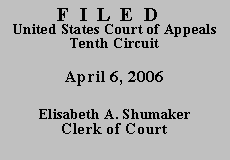

| AMANI IBRAHIM; MAGDY FAM,
Plaintiffs-Appellants, v. PENNSYLVANIA NATIONAL MUTUAL CASUALTY INSURANCE COMPANY, a foreign corporation, Defendant-Appellee. |
|
Appellants previously lived in North Carolina and bought an automobile insurance policy from Penn National there. Appellants asserted that they were involved in a three-vehicle accident on an icy highway in Oklahoma in December 2002. They alleged that they successfully swerved to avoid an out-of-control vehicle, but they were then struck by a semi-truck and the out-of-control vehicle fled the scene. Appellants filed a claim for uninsured motorist benefits for the injuries allegedly caused by the hit-and-run vehicle. Penn National paid a $1000 med-pay benefit to appellants' Oklahoma health care providers and paid for the damage to appellants' car. Otherwise, Penn National denied appellants' uninsured motorist claim on the basis that there was a lack of evidence of a hit-and-run vehicle and appellants were responsible for the collision with the semi-truck under Oklahoma's comparative negligence law.
Appellants sued Penn National for bad faith and breach of contract in the Northern District of Oklahoma. Penn National moved for summary judgment, arguing that Oklahoma's choice-of-law rules and the choice-of-law clause in appellants' insurance policy called for the application of North Carolina law and that, under North Carolina law, a claim for uninsured motorist benefits must be based on a physical collision between the vehicles, which appellants agreed did not occur here. The district court analyzed Oklahoma's choice-of-law rules at length and decided that North Carolina law, not Oklahoma law, governed the contract between the parties. The court further determined that appellants' bad faith claim sounded in contract rather than tort, and, as a result, it also was governed by North Carolina law. The court therefore granted summary judgment to Penn National.
"We review the district court's grant of summary judgment de novo, applying the same legal standard used by the district court." Simms v. Okla. ex rel. Dep't of Mental Health & Substance Abuse Servs., 165 F.3d 1321, 1326 (10th Cir. 1999). "Summary judgment is appropriate 'if the pleadings, depositions, answers to interrogatories, and admissions on file, together with the affidavits, if any, show that there is no genuine issue as to any material fact and that the moving party is entitled to a judgment as a matter of law.'" Id. (quoting Fed. R. Civ. P. 56(c)). "When applying this standard, we view the evidence and draw reasonable inferences therefrom in the light most favorable to the nonmoving party." Id.
Appellants argue on appeal that: (1) the district court erred in finding that Penn National could improperly deny coverage on one basis, but later be absolved of bad faith when its counsel discovered, after the denial and after suit was filed, that there was a different basis for denial; (2) there is sufficient evidence that Penn National's actions during the handling and denial of appellants' claim constituted bad faith, and summary judgment was therefore improper; (3) Penn National should be estopped from rejecting the application of Oklahoma law because Penn National relied on Oklahoma law to deny appellants' claim; and (4) Penn National breached its contract with appellants or, alternatively, breach of contract is not an essential element of a bad faith tort claim.
Appellants do not challenge the basis of the district court's decision, which was that under Oklahoma's choice-of-law rules, North Carolina law governs and defeats both of appellants' claims in this case. We therefore affirm the district court's grant of summary judgment to Penn National. We reject, for two reasons, appellants' argument that Penn National should be estopped from relying on North Carolina law after appellants filed suit, when the company relied on Oklahoma law before appellants filed suit. First, we ordinarily do not address arguments presented for the first time on appeal, and appellants did not raise their estoppel arguments in the district court. See Singleton v. Wulff, 428 U.S. 106, 120 (1976). Second, appellants do not present a reasoned argument (as opposed to a mere conclusion) that either the doctrine of quasi-estoppel or the doctrine of judicial estoppel applies to this case. See Phillips v. Calhoun, 956 F.2d 949, 953-54 (10th Cir. 1992).
Appellee's motion to strike is denied. The judgment of the district court is AFFIRMED.
Entered for the Court
Circuit Judge
*. After examining the briefs and appellate record, this panel has determined unanimously to grant the parties' request for a decision on the briefs without oral argument. See Fed. R. App. P. 34(f); 10th Cir. R. 34.1(G). The case is therefore ordered submitted without oral argument. This order and judgment is not binding precedent, except under the doctrines of law of the case, res judicata, and collateral estoppel. The court generally disfavors the citation of orders and judgments; nevertheless, an order and judgment may be cited under the terms and conditions of 10th Cir. R. 36.3.